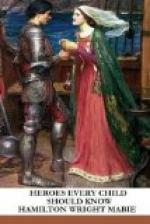Then Alvar Fanez and his people went after the Bishop Don Hieronymo and Gil Diaz, who, with the body of the Cid, and Dona Ximena, and the baggage, had gone on till they were clear of the host, and then waited for those who were gone against the Moors. And so great was the spoil, gold, and silver, and other precious things that the poorest man among the Christians, horseman or on foot, became rich with what he won that day. And when they were all met together, they took the road toward Castille; and they halted that night in a village which is called Siete Aguas, that is to say, the Seven Waters, which is nine leagues from Valencia.
When the company of the Cid departed from the Siete Aguas, they held their way by short journeys. And the Cid went alway upon his horse Bavieca, as they had brought him out from Valencia, save only that he wore no arms, but was clad in right noble garments, Great was the concourse of people to see the Cid Ruydiez coming in that guise. They came from all the country round about, and when they saw him their wonder was the greater, and hardly could they be persuaded that he was dead.
At this time King Don Alfonso abode in Toledo, and when the letters came unto him saying how the Cid Campeador was departed, and after what manner he had discomfited King Bucar, and how they brought him in this goodly manner upon his horse Bavieca, he set out from Toledo, taking long journeys till he came to San Pedro de Cardena to do honour to the Cid at his funeral. And when the King Don Alfonso saw so great a company and in such goodly array, and the Cid Ruydiez so nobly clad and upon his horse Bavieca, he was greatly astonished. And the King beheld his countenance, and seeing it so fresh and comely, and his eyes so bright and fair, and so even and open that he seemed alive, he marvelled greatly.
On the third day after the coming of King Don Alfonso, they would have interred the body of the Cid, but when the King heard what Dona Ximena had said, that while it was so fair and comely it should not be laid in a coffin, he held that what she said was good. And he sent for the ivory chair which had been carried to the Cortes of Toledo, and gave order that it should be placed on the right of the altar of St. Peter; and he laid a cloth of gold upon it, and he ordered a graven tabernacle to be made over the chair, richly wrought with azure and gold. And he himself, and the King of Navarre and the Infante of Aragon, and the Bishop Don Hieronymo, to do honour to the Cid, helped to take his body from between the two boards, in which it had been fastened at Valencia. And when they had taken it out, the body was so firm that it bent not on either side, and the flesh so firm and comely, that it seemed as if he were yet alive. And the King thought that what they purported to do and had thus begun, might full well be effected. And they clad the body in cloth of purple, which the Soldan of Persia had sent him, and put him on hose of the same, and set him in his ivory chair; and in his left hand they placed his sword Tizona in its scabbard, and the strings of his mantle in his right. And in this fashion the body of the Cid remained there ten years and more, till it was taken thence and buried.




